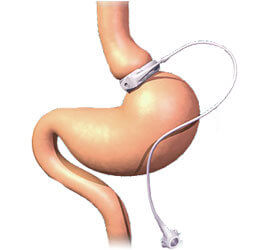
Gastric band surgery is an increasingly popular procedure that aids weight loss in those who are overweight. The surgery involved reducing how much food your stomach can hold by tightening an adjustable band around it. Every patient is different and undergoes a surgery targeted exactly to them and their needs, and this will be discussed prior to your procedure with your surgeon.
Gastric band surgery is only an option if your weight is affecting your health, more commonly known as being morbidly obese. Gastric band surgery is carried out as your surgeon creates a small pouch from the top of your stomach. This small pouch can only hold so much food, and in turn that means you’ll be eating less and you feel full much quicker than before. Thus, you’ll begin to lose weight. To really obtain good results from your gastric band surgery, it’s important the food you are eating is healthy and that you’re participating in regular exercise.
The great thing about a fitted gastric band is that it is adjustable. The band itself is somewhat alike to a tube shaped balloon, and this can be inflated by injecting liquid into it. Over time, the band can loosen, so going back to your surgeon for an adjustment can ensure the band is still working in your favour. As you eat food, the small pouch at the top of your stomach fills up very quickly, and the band also slows down the movement of food into the lower part of your stomach, beneath the band. From here, food will travel normally through your digestive system.
The amount of weight a gastric band will help you to lose depends mostly on the person, as well as the effort they put in after it has been fitted to eat healthily and take part in exercise. However, studies have shown that most people lose between half and two thirds of their excess weight within the two years subsequent to surgery. Though a gastric band can be taken out if needed to, for example if you are experiencing complications, it is designed to long-term, and removing it can result in weight gain.
Gastric band surgery is an operation, and therefore it will take some preparation beforehand to ensure you are fit and ready. If you are a smoker, it’s important you try to stop or cut down. This is because smoking increases your risk of chest and wound infections, and thus this can slow how quick you recover. You may also be asked to follow a low-fat, low-carbohydrate diet for up to a month before your surgery. It’s important you follow anything instructed to you via your surgeon, and this diet can help to shrink your liver, making it easier and safer for your surgeon to fit the band.
Gastric band surgery is undergone under general anaesthetic. For those who have never had this, it means you will be unconscious and asleep throughout the duration of the surgery, and won’t feel a thing. Often, you will need to stay in the hospital overnight to allow your surgeon and nurses to keep an eye on you and how you are progressing.
On average, it can take up to two weeks to make a full recovery and resume to your normal routines and activities, though this can differ from person to person, so talk to your surgeon and follow their advice. It’s likely you’ll feel sore, so taking some standard painkillers such as paracetamol or ibuprofen should do the job. If you have any worries or queries, don’t hesitate to ask your surgeon.
If you’d like to find out more information regarding gastric bands or any other bariatric procedures, get in touch with a member of The Bariatric Group’s friendly team today by visiting our contact page or by giving us a call on 0808 1280 022- we’d love to help!
-
Disclaimer: Please note that weight loss surgery results and benefits are unique to each individual and in such The Bariatric Group cannot guarantee specific weight loss goals as results for each surgery can vary. If you have any questions or would like to know more about weight loss surgery please contact our expert team.





